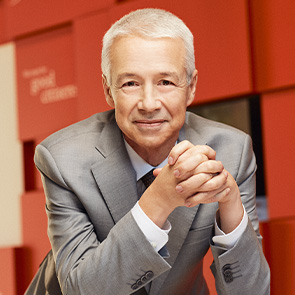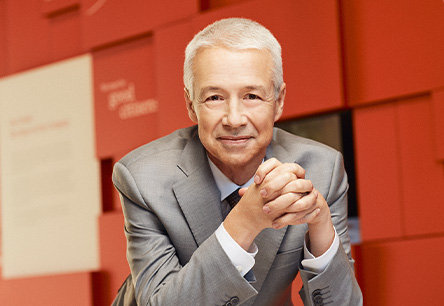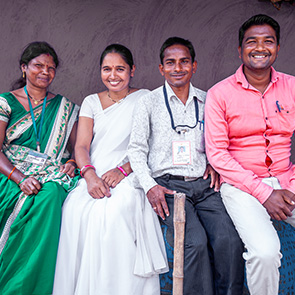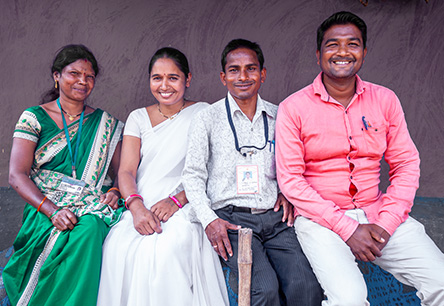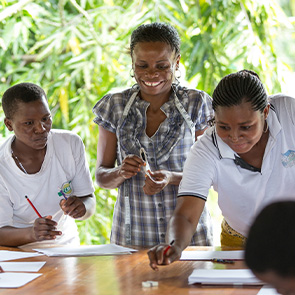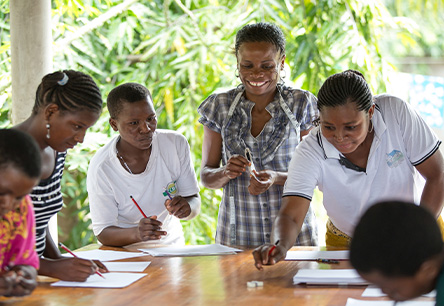The challenge to end tuberculosis (TB) remains a priority for healthcare, especially in resource-limited settings. At Johnson & Johnson, we continue to meet this challenge, both in the lab and at the last mile of health, driven by our 10-year TB initiative and two decades of experience in the fight against TB.
More than three years since the start of the COVID-19 pandemic, the world is still fighting to regain progress that had been made in combating TB. For the first time in several years, there was an increase in people falling ill with TB in 2021, and deaths continue to increase year over year.34
Globally, the estimated number of deaths from TB increased between 2019 and 2021, reversing years of decline between 2005 and 2019. In 2021, 1.6 million people died from TB, including 187,000 people with HIV.35
Rising AMR and the “missing millions” of undiagnosed people continue to be challenges. In 2022, we made great strides to help reignite the global fight against TB through our collaborations, continue our commitment to our patients, reinvest in the development of new treatments and advocate on behalf of the people most affected by TB.
Without treatment, the death rate from TB is high (about 50%). With currently recommended treatments (a four- to six-month course of anti-TB drugs), about 85% of people can be cured.36
Health for Humanity 2025 Goals
View ScorecardProgress in Access to Tuberculosis (TB) Treatment
- In 2022, 134,000 patients received access to bedaquiline potentially averting 1.2 million new MDR-TB infections.
- From 2021–2022, 269,000 patients received access to bedaquiline, potentially averting 2.4 million new MDR-TB infections.
On track
Progress in Developing TB Treatment
- Continued clinical development for a novel, collaborative asset, including dosing completed in a Phase I study.
- Progress was also made with consortia groups, including UNITE4TB and PAN-TB, using bedaquiline as a key component in several studies.
On track
Howard Reid
Global Head of Global Public Health and Social Impact, Johnson & Johnson
Milestones in our fight against TB
December 2022 marked 10 years since the accelerated approval of SIRTURO (bedaquiline) by the FDA. When Johnson & Johnson received approval for SIRTURO (bedaquiline) in 2012, it was the first TB medicine with a novel mechanism of action in more than 40 years. Since then, bedaquiline has been recommended by the WHO as a core component of all-oral treatment regimens for MDR-TB and is available to countries representing 99% of the global TB burden.
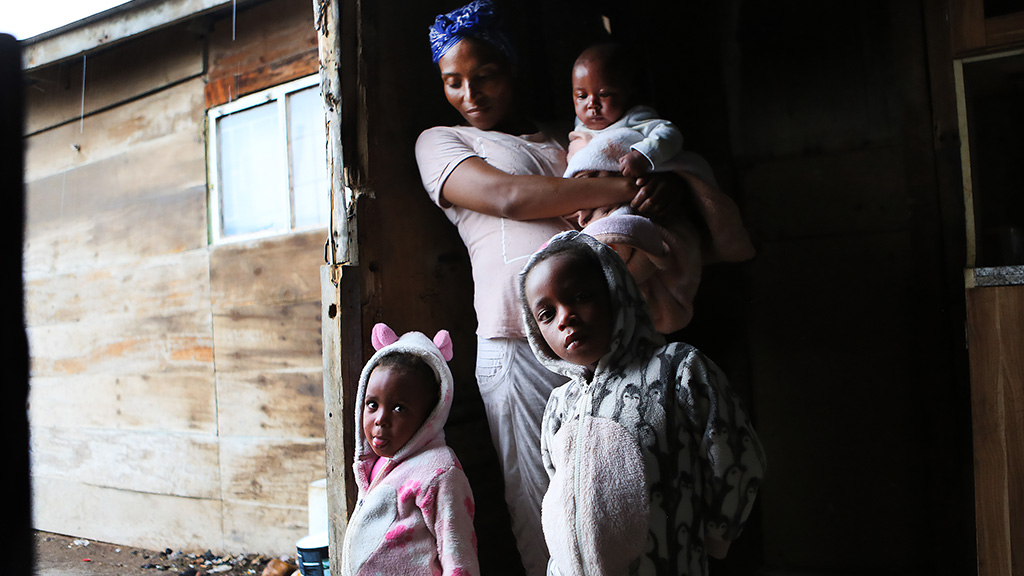
In 2022, we reached a milestone with more than 586,000 courses of SIRTURO (bedaquiline), our multidrug-resistant tuberculosis (MDR-TB) medicine, delivered cumulatively to 158 countries, including all 30 high-burden TB countries.37
This milestone represents a critical part of our 10-year initiative to help end TB, but our work continues. Johnson & Johnson is continuing to collaborate across sectors to enable access to our medicine for MDR-TB patients around the world, with a focus on expanding access to the pediatric formulation of bedaquiline as part of the Rome 5 Action Plan and safeguarding its long-term effectiveness through careful stewardship. Beyond our medicine, we are also continuing to support global efforts to help find the “missing millions” of people with undiagnosed TB and advance innovative R&D to develop the next generation of TB treatments.
Since 2012, bedaquiline has been registered in 72 countries, more than any other medicine specifically developed for the treatment of MDR-TB, advancing availability to countries with the greatest need.
3 of 4 MDR-TB patients globally are now enrolled on all oral bedaquiline-containing regimens.
In 2022, new scientific data was generated to support the safety and efficacy of bedaquiline. The STREAM Stage 2 clinical trial is the world’s largest clinical trial for MDR-TB and was conducted by the Medical Research Council Clinical Trials Unit at University College London and sponsored by Vital Strategies, Inc. With nearly 600 participants enrolled, from eight countries on three continents, the trial found both bedaquiline-containing regimens, a nine-month oral regimen and a six-month regimen with eight weeks of second-line injectable, had superior efficacy compared with a nine-month injectable-containing regimen, with fewer cases of hearing loss. This fills an important gap in evidence on shortened regimens for MDR-TB.38
Additionally, a study39 of more than 5,000 patients with MDR-TB from 14 sites in South Africa showed that treatment with a bedaquiline-containing regimen was associated with better survival and effectiveness compared to non-bedaquiline-containing regimens in patients with MDR-TB.
Studies such as these help underscore the importance of bedaquiline in helping solve one of today’s greatest global health challenges and reinforce confidence in the effectiveness of the treatment in adults, adolescents and children.
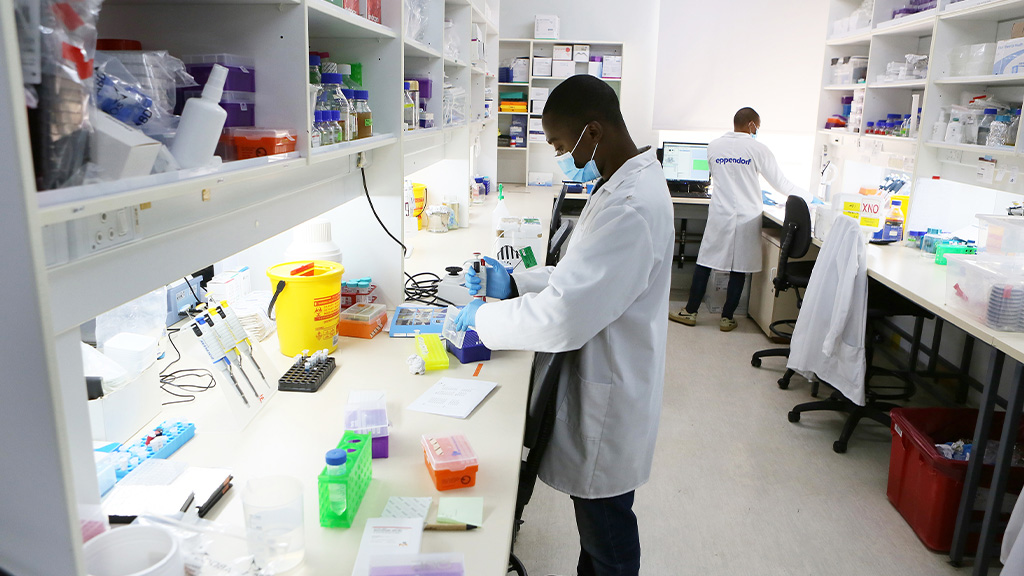
A scientist conducting TB research at Groote Schuur Research Centre, South Africa.
Collaborating to advance TB drug regimens
In 2022, the Project to Accelerate New Treatments for Tuberculosis (PAN-TB) collaboration announced the execution of a joint development agreement (JDA) supporting the progression of two investigational TB combination treatment regimens into Phase 2 clinical development. The collaboration will evaluate whether the novel regimens, which combine registered products and new chemical entities, can effectively treat all forms of active pulmonary TB using substantially shorter treatment durations than existing drug regimens, with the goal of identifying a regimen suitable for Phase 3 development.
Recognizing that no single organization produces the full range of drugs needed to respond to TB, the PAN-TB collaboration brings together philanthropic, nonprofit and private-sector organizations to accelerate the development of novel, shorter drug regimens to treat all forms of TB. Alongside Johnson & Johnson’s bedaquiline, four additional antimicrobial agents are to be evaluated under the new JDA.
Ruxandra Draghia-Akli, M.D., Ph.D.
Global Head, Global Public Health R&D, Janssen R&D
There is still a large global gap between the estimated number of people who fell ill with TB and the number of people newly diagnosed, with 4.2 million people not diagnosed with the disease or not officially reported to national authorities in 2021, up from 3.2 million in 2019.40
In addition to PAN-TB, our membership in several research collaborations and consortia is ongoing. These include the following TB initiatives, which are all part of the Innovative Medicines Initiative (IMI):
- UNITE4TB: This global consortium of 30 collaborators from 13 countries, launched in 2021, aims to advance anti-TB science and enable the progression of new, safe and affordable treatment solutions for TB patients worldwide. During the first year of the project, a sponsor was chosen for the first Phase 2 clinical trials; innovative clinical trial designs were developed; and the project shortlisted the first trial sites in Africa, Asia, Europe and South America.
- ERA4TB: The ERA4TB initiative integrates more than 30 organizations from the EU and the U.S. over a six-year period starting from 2020 to develop at least two or more new combination regimens with treatment-shortening potential ready for Phase 2 clinical evaluation.
- RESPIRI-TB: An international research consortium of eight European academic and biotechnology organizations, IMI RESPIRI-TB aims to develop a new, more efficient combination-drug regimen to cure MDR-TB, with a focus on shortening treatment duration and minimizing the likelihood of resistance.
- EU-PEARL: A strategic consortia between the public and private sectors to shape the future of clinical trials, developing the specific Investigational Research Platform frameworks for trials ready to operate in disease areas still facing high unmet need. Our GPH organization jointly leads the working group on TB, and, in 2022, the group presented a new approach to designing an adaptive platform trial for TB.
Engaging youth to build a TB-free future
On World TB Day in 2022, Johnson & Johnson came together with the global community to progress a series of initiatives in high-burden countries aimed at helping to empower a generation of youth to end TB. The initiatives advance global efforts to help find the missing millions of people living with undiagnosed TB and are part of Johnson & Johnson’s 10-year initiative to help drive progress toward ending the disease by 2030, aligned with a target of UN SDG 3.
Through wide collaboration, our initiatives aimed to engage young people to drive health-seeking behavior, build community awareness, improve active case finding and reduce stigma to enhance early diagnosis of TB, all with a goal of encouraging people with TB to seek the care and treatment they need.
Some examples of our activations on World TB Day include:
- China: In 2022, we celebrated the conclusion of a three-year collaboration with the Chinese government on TB, as China is one of 30 high-burden TB countries. Our role was to assist the Chinese government in addressing the TB challenge across the country and build evidence to support policy suggestions and technical solutions to the National Health Commission of China to further improve diagnosis rates. The project was carried out across a population of about 10 million in the three prefectures of Ganzhou, Linfen and Yulin and involved training healthcare providers, improving access to molecular tests for high-risk populations and streamlining TB case reporting and tracking mechanisms. Additionally, we collaborated to launch a youth volunteer and patient-finding initiative in the Sichuan and Zhejiang provinces and supported public awareness campaigns focused on TB, including the “I’m a Great Doctor” TB special on Beijing TV.
Jenny Zheng
President, Xi’an Janssen
- India: In collaboration with the National TB Elimination Program in India, we launched a youth-focused, digital-first campaign called Be the Change: Badlaav (“change” in Hindi). Through social media, chatbots and more, the initiative aims to create youth “changemakers” for TB to encourage health-seeking behavior, increase awareness about the disease and build youth engagement and participation in support of the Indian government’s vision of a TB-free India. Additionally, with sponsorship from Johnson & Johnson, the MTV Staying Alive Foundation expanded on the success of MTV Nishedh, a youth-focused “edutainment” campaign in India, by launching a new season in November 2022. As part of this initiative, the Foundation developed a 10-episode drama series focused on the lives of young people in India and touched on TB storylines in an effort to raise awareness around the disease, reduce stigma and promote early detection of symptoms.
- Southeast Asia: Johnson & Johnson launched TB Warriors, an initiative in collaboration with the National TB programs of Indonesia, the Philippines, Thailand and Vietnam to educate youth about TB in a fun and entertaining way using social media, mobile games and more. In the Philippines, we also collaborated with the Philippine Tuberculosis Society, Inc. to launch a youth community case-finding initiative, from awareness to care.
- South Africa: Building on our pediatric DR-TB collaboration with Aquity Innovations in South Africa, the Johnson & Johnson Foundation Scotland and Aquity collaborated with EPCON to launch an initiative to improve health-seeking behavior among youth and conduct a new insight study to better understand barriers to care for children and youth.
Sarthak Ranade
Area Managing Director, South East Asia and India, Janssen
Our engagement with the Ending Workplace TB initiative, a multisectoral collaboration that we co-launched in 2020, continued. In 2022, the initiative grew from 24 to 48 multinational companies pledging to address TB in their workforce.
34 WHO, “Global Tuberculosis Report 2022 Factsheet,” https://www.who.int/publications/m/item/global-tuberculosis-report-2022-factsheet, accessed February 2023.
35 Ibid.
36 Ibid.
37 Upon review of the data and reconciliation processes, a change was needed to correct the annual number of courses of SIRTURO (bedaquiline) shipped for years 2018 to 2021, which resulted in a 1.1% reduction in the total cumulative shipments from 593,000 to 586,000 between 2014 and 2022.
38 Goodall RL, Meredith SK, Nunn, AJ, et al, “Evaluation of two short standardised regimens for the treatment of rifampicin-resistant tuberculosis (STREAM stage 2): an open-label, multicentre, randomised, non-inferiority trial,” The Lancet, https://www.thelancet.com/journals/lancet/article/PIIS0140–6736(22)02078-5/fulltext, accessed February 2023.
39BMC, “Bedaquiline safety, efficacy, utilization and emergence of resistance following treatment of multidrug-resistant tuberculosis patients in South Africa: a retrospective cohort analysis,” https://bmcinfectdis.biomedcentral.com/articles/10.1186/s12879-022-07861-x, accessed February 2023.
40 WHO, “Global Tuberculosis Report 2022 Factsheet,” https://www.who.int/publications/m/item/global-tuberculosis-report-2022-factsheet, accessed February 2023.

